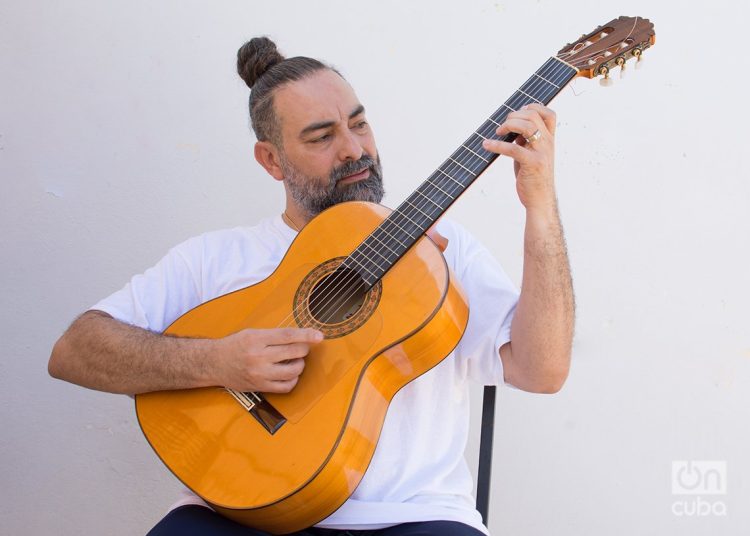Alain Pérez (Trinidad, 1977) is a jack-of-all-trades of Cuban music. The kid who left Manaca Iznaga to sing when he was less than ten years old has become, with the passage of time and an extensive tour of international stages, one of the most complete and respected artists on the island, both inside and outside of it.
Singer, multi-instrumentalist, composer, producer, arranger, band director, Alain has taken his music around the world, has been nominated for and won the Latin Grammy, and has worked alongside figures such as Paco de Lucía, Chucho Valdés, Celia Cruz, Isaac Delgado, Enrique Morente, Diego El Cigala, and many others.
However, even with all that experience and accumulated knowledge and influences, he has not lost even an iota of Cuban identity. If anything, he has strengthened and expanded it, without failing to always recognize his roots, an essence that, he confirms, comes naturally to him and that he drank — and continues to drink — from his father, the poet and composer Gradelio Pérez.
He was able to bet on already proven formulas, on commercial shortcuts to success, but he has preferred to maintain his authenticity and follow a path that does not shy away from experimentation with different currents and sounds, but always with Cuban popular music as the center, as a forked prop from which to leave and return to.
“I risked being what I am,” Alain confesses, with honesty and also with healthy pride, about his musical commitment, while ensuring that he keeps his arms open “to the world of music,” but “always as a Cuban musician.”
These days Alain Pérez is on tour in Mexico, where since last weekend he has been performing on stages in Xalapa (Veracruz) and at the well-known Mamá Rumba club in the Mexican capital. In addition, he will teach a master class at the MAP School, in Puebla.
Then, after a brief stay in Havana, he will leave at the beginning of December for Europe, where he will give several concerts. Spain and Paris will be the destinations this time for the artist, who is grateful to be able to end the year with an intense professional agenda, “something that is difficult because these are difficult times to leave with the entire team and the entire band from Cuba.”
But, beyond the immediate, Alain is enthusiastically facing prospective projects for next year, such as the release of a new album and his participation in Norah Jones’ highly publicized — and controversial — visit to Havana.
“Right now I am eager to start recording my new album, which I plan to call Bingo and for which I already have the repertoire, always with the help of my father Gradelio Pérez,” he tells OnCuba.
The album, which the musician wants to have ready before May and present to the Latin Grammys and the Cubadisco award, is currently in the negotiation phase with the Altafonte company and will have songs by composers common in his work, such as his father Gradelio and Juan Antonio Gómez, also from Sancti Spíritus.
They are now joined by his brother Rainer, who, according to Alain, “is inspired” and “gets the poet from my father and also has the freshness of his age, and is more connected to the current language.”
What will be the musical concept of the new album? Will you continue the line you have been working on or will you introduce changes in the way you approach music?
The truth is that I like to change, I like to emigrate through music. I think it is because of what I have had to live, because of my experiences outside of Cuba; for being able to collaborate with so many artists, learn and enrich myself in other forms and other timbres, from other cultures.
That always leads me to look for something different, to propose something new, although always within our roots, because the foundation of what I have been doing with the band is Cuban music: Cuban dance music.
Other tones will appear on this album, it will even have some nods to current, urban music, in tone, not in words. Also to gospel music and the influence of flamenco, to those melodic and harmonic nuances that increasingly appear in my music and that come out organically, but always from the voice of the sonero, from the Cuban voice, from our identity.
I always bet on proposing something fresh and that will be the case on this album. I am interested in freshness, in finding a reason that connects with the public, but that makes me happy, that fills me, that convinces me musically, because I am committed to making good music, to bringing a careful message to the public, from a current, contemporary, popular perspective, but well done.
That seems essential to me because I believe that we must clean up Cuban music, the vulgarity and superficiality, and other evils that are affecting it.
As an artist, you seem to have a very clear idea of what you want to achieve with your music…
It’s not that it’s always been like this, but I feel like I’m starting to mature more and more in what I want to say in music, to be more exact with what I want to achieve. I feel closer to my inner voice. I’m not interested in copying old formulas. That may be the easiest way to achieve success, but it is a path without authenticity.
Humbly, I am a student of music, and I know what the music of Arsenio Rodríguez is like, what that of Chucho Valdés is like, what the formula of Irakere is, or that of NG La Banda, or that of Los Van Van, or that of the Charanga Habanera. I could do as others do, copy formulas: I want to sound more charanguero and I make music like the Charanga, or I want to sound more timbero, and then I use the NG formula, and maybe tomorrow I’ll be a hit, but that is not my interest as an artist, nor has it ever been.
So I risked being what I am, with humility, with sincerity, with Cubanness, and also with study, with the years that one already has of experience. Thanks to it, one already knows what one wants and what one is doing, and one has an identity.
With all the arsenal you have drawn from and the figures you have worked with, the currents and influences that have marked you, what is the center of your music?
Look, I left home practically to work when I was 9 years old. At that age I left Manaca Iznaga, in Trinidad, to sing with the group Cielito Lindo, in Cienfuegos. I left my parents’ house, my town, which was where I first fell in love with music, and where I drank in a tradition, and I stayed in the house of Enrique Pérez, who was the director of Cielito Lindo. Since then I haven’t stopped.
My whole life has been music. I entered the Conservatory, from there to the ENA, from the ENA to Iraqere, which is easy to say, but it is a tremendous thing; then to Isaac Delgado’s band, from there to Spain with Paco de Lucía, with Celia Cruz, with Enrique Morente, with great musicians who came into my life at one moment and have stayed forever. It’s actually been many years, but they are years that have made me who I am.
With all this, there is something that seems very important to me and that is central to my music: that transparent essence of identifying with the most genuine, with the most traditional, with the purest. I never lose that essence. That is something that is not forced, it is in me. It is a blessing to say: “I am this first of all.” I am a guajiro, I am a sonero, I am a guarachero, I am a rumbero. That essence is clear to me.
What happens is that, thank God, life took me to the world of music and I, with all humility, have opened my arms to it, but always as a Cuban musician, from the perspective of a Cuban musician.
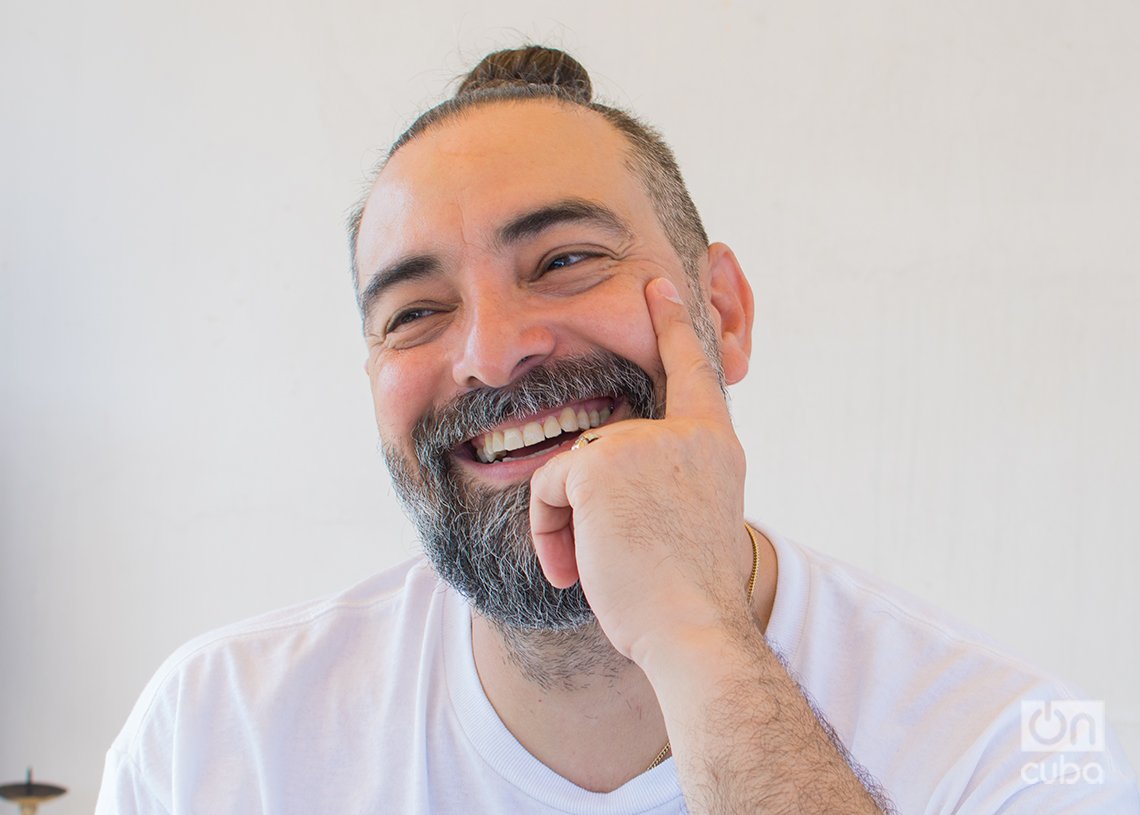
More than a musician, you are a kind of musical jack-of-all-trades. You sing, play various instruments, produce, arrange, direct your own band…. How do you combine all these functions? What has that training process been like?
One is trained little by little as an artist and learns, experiments, and expands. But there is one thing that is born with one, which is what is natural, what is one’s own.
I got on stage and no one told me how to move, or how to sing, or how to dance. That was born with me. But through the years, through study, through school, through discipline, through experience, one grows, develops, and evolves, from what one is naturally, from that essence and that tradition that one brings with one.
Now, traditional is the basis, but it has limits, and to grow you have to go beyond. You are forced to do it so that your music expands so that your language grows. You have to know and study other currents, classical music, jazz, so-called world music, flamenco… All of this made that traditional musician from Manaca Iznaga, who is Alain Pérez, become what he is today.
And yes, it has been a gradual process. It has even grown over the years; things have been incorporated in each of my stages. The musician that I am, the artist that I am, has grown with the person.
The mastery of different specialties, of different instruments, is the result of that growth, of that evolution, and interest has also been and is fundamental in that process, because if there is no desire, if there is no interest, if there is no discipline, if there is no respect, if there is no love for what you do, for music in general, you do not reach that knowledge and that evolution, nor does the music really reach you.
Throughout your career, you have won awards such as the Latin Grammy, or the Latino de Oro, in Spain. What do the awards represent to you? Do you consider them a measure of your career success?
The awards are important, but they are still a surprise, at least for me. It’s like I’m never prepared for them, honestly, because that’s not what I work for. That’s not the point of what I do. But when they arrive it is very nice, very gratifying, because after a period of life and career, they represent that that time has meant something beyond you, it has meant something to other people, to music.
For me, music, my career, more than a way to win an award or be famous, is always a challenge: the challenge of finding motivation, desire, and strength to move forward, to continue doing, to continue giving people what I do.
In a documentary that I recently shared with the Spanish singer Silvia Pérez Cruz, they asked us what success was for us, and it is true that success has many ways of manifesting itself, and that everyone does not see it in the same way, but for me, success is in feeling that desire every day, that motivation to continue making music, to do what I like.
I enjoy what I do. It’s difficult, it’s tough, but it fills me and I need it. That’s success for me.
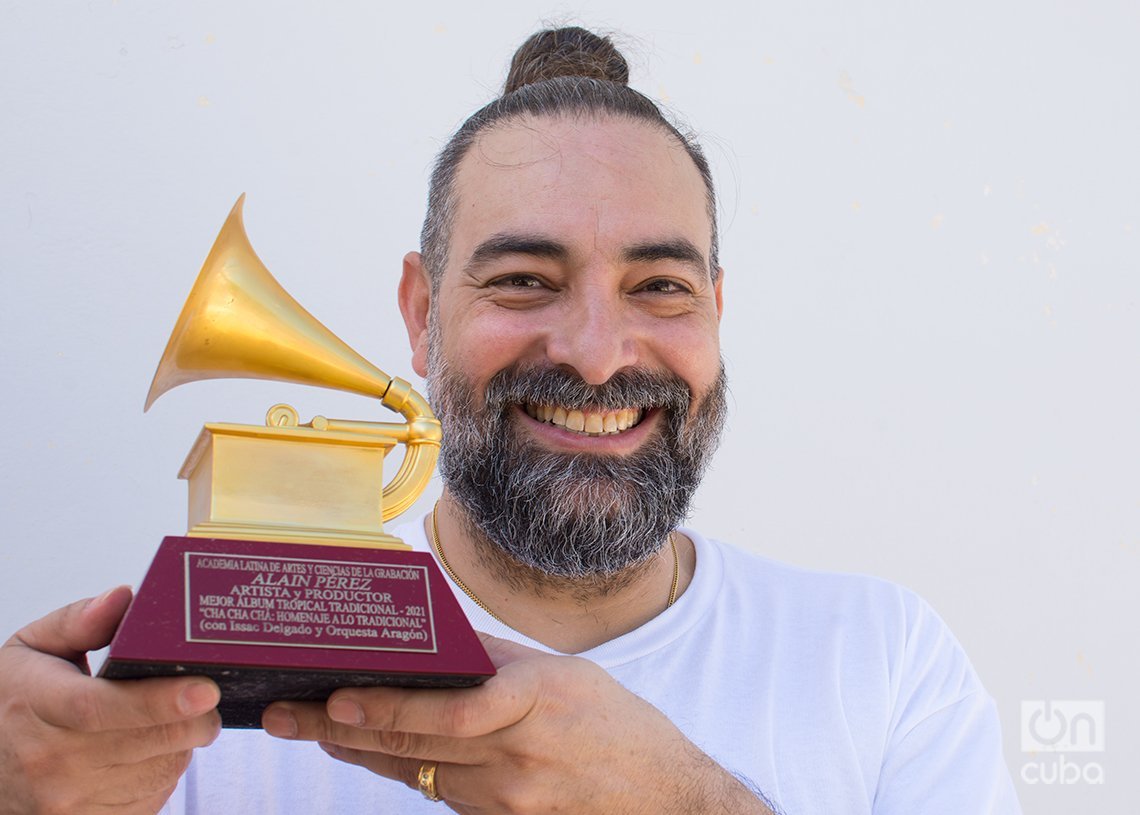
Since you mention it, can you tell us about that project with Silvia Pérez Cruz?
It’s something we already did. It is a four-part documentary series that was recorded on an island called Don Simón, next to Vigo, in Spain, an incredible place. The series includes recording the process of creating a song between two artists, and in the last chapter that duet is made up of Silvia and I.
We had in common that she knew Cuba, she had been here several times, we knew each other personally, and that bond was taken advantage of. But everything is made from scratch. The creative process of writing a song together is recorded, documented, and at the end the musicians come, we put together that song and play it live in concert. All this with a tour of interviews, with questions, with stories from the island.
It was a very nice experience, with an incredible production display. It was recorded for Spanish television and it is very possible that it will reach Netflix. It is currently in post-production and should be broadcast when the entire series is ready.
Another project in which you are involved, but this one still being planned, is Norah Jones’ visit to Cuba. How did you get there and what will happen to you?
It seems she asked for me to be on the show. That’s what they told me, that she asked to listen to me, which, imagine…. I still don’t know exactly how it happened, but it seems that some reference about me reached her. Maybe she knew about my work with Paco de Lucía, knew that I was in Cuba, and was interested in having me join the project.
I think that the freedom with which I approach music, which I assume as an artist, which entails taking risks and experimenting when making music, connects you with other people and artists who have your same projection, that same spirit, even if they are manifest from other genres, other sounds. In the end that’s it.
And I am very happy, to be honest, to be able to be part of this experience. I hope and God wanting everything goes well so that she can be with us here, because no matter how it is, it is a great motivation. It is a reason for shining, for satisfaction, that Cuba is chosen for something like this, despite all the problems we have, to continue making music, to show what we do, to exchange and experiment as artists, and to welcome here such a recognized figure as her.
Imagine if we end up doing a song together. It would be wonderful, really.
You have spent a great deal of your career forming part of groups led by other artists, but now you have your own band, to make your music…
That’s right, and I’m happy because right now I have a practically new band. I am a trainer and an educator. New musicians, young people, are always passing through the band, through my hands, and I also enjoy that training work.
In these years, incredible musicians have passed through the band and then moved on, made their projects, and settled in other countries. It is no secret that emigration is a very present phenomenon in Cuba, which affects all sectors, and music is not exempt from that situation.
Despite that, I am very happy with the band, because talents always come out here in Cuba, young people always come out, musicians who, luckily for me, are connected with my way, with my language, with my energy, because energy, feeling, spirit is also very important in music. And it’s good for these kids, these young musicians, to talk to them about that, about the commitment, about the feeling.
It’s not just knowing how to play well and do the job. It can’t be like that. It is necessary to go further. There has to be a commitment to that energy, to that spirituality that is transformed into music, that is transformed into truth, into our truth.
Music is not a mere profession, it is a way to reflect that truth, to radiate that spirituality and that feeling. It is not something that is done and that’s it; it is something that is felt.
You talked about the impact of emigration on Cuban music and, in particular, on your band. How do you deal with this forced renewal of musicians to maintain the hallmark and energy of your musical project?
It’s not simple. I have been able to do it in anticipation. All the time I’m looking, I’m looking, I’m recruiting possible new musicians for my band, young people who can replace some of my musicians if they don’t continue with me tomorrow, and who at a given moment can be at the level that I maintain in my band, or that they already understand what I stand for, that they have a harmony and chemistry with my music.
For example, the pianist I have now took the place of Andy García, who grew up with me for seven years in the band and became a star. He got to me recently graduated, green, with a lot of energy, a lot of desire, very sensitive, very talented, and he polished himself and grew during that time that he was in the band.
About four years ago a kid came up to play the piano at one of the concerts, he was a boy, he was about 15 years old, and I asked who he was, and I instantly connected with him. That boy, Josué Puig, is today the band’s pianist. He was the one who replaced Andy.
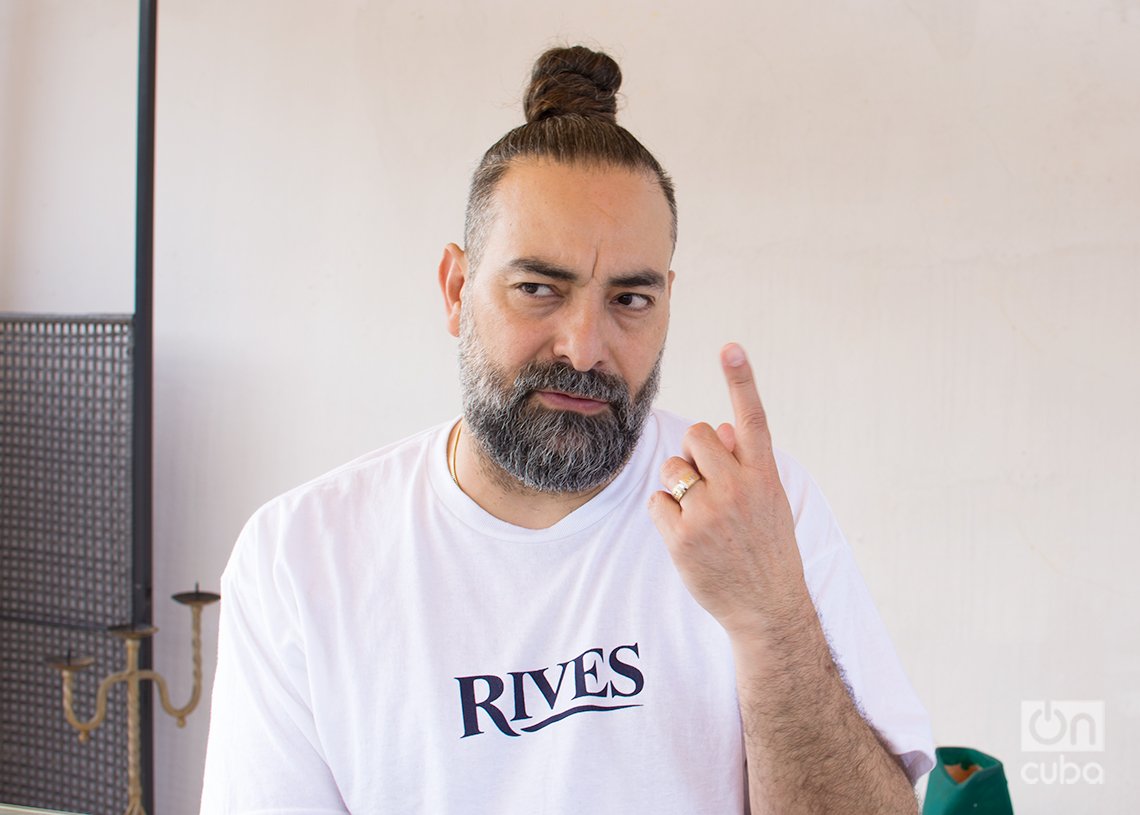
It must be a bit frustrating having to go through that process over and over again…
A little, yes. It’s exhausting, but you know what? In the end, I’m grateful for it, because it’s also refreshing, and you kind of reset yourself with those new musicians that come to you, with their own forms, with their influences.
You must have the spirit and the vocation to teach and train, and at the same time be open to receive. And in the end, when they leave, it’s not that they are lost. It is Cuban music that radiates to the world, and it is gratifying to know that one also put some of one’s knowledge and feeling into those musicians.
It’s not easy, because they are young boys who at first may not understand why I am so demanding about wanting something specific: this sounds like this, guys, and you have to play it like this, this is the language, this is the aesthetics and this is the energy it carries, and, of course, at first that pressure can be hard for them.
But I always ask them to understand that my desire is for them to leave prepared for the future, that wherever they go they are prepared and at the level of a professional musician without borders, that they can take on any challenge in music and that they put a high value to Cuban music with their work.
So they experience that and they thank me for it as time goes by, because they realize that it is like that. All this exigency has a reason and a meaning. And that’s nice, it’s comforting, even if you have to go through it again from time to time.
Many artists, specialists, and people in general are concerned about the current moment of music in Cuba. Do you also share that concern? What is your perception of what is happening?
Things are difficult. It is a situation that does worry, I don’t know if it worries everyone, but it does worry me and other musicians and friends, knowledgeable people like Alden González, who a few days ago published a post on Facebook lamenting that Son 14’s 45th birthday will go practically unnoticed in Cuba, and also to people I know who are genuine representatives of Cuban music.
It is a common concern and we have talked about it, about how to maintain the strength of our music, which is authentically Cuban, and how to continue reaching the public, the young people.
It is complicated because we have to deal with many things, with the market, with the dissemination mechanisms, with the social and cultural scenario of the country itself. Urban music became fashionable in a tremendous way, and I’m not saying that there can’t be good things within that genre, but there is also a visible degradation in society in general, not only in Cuba, but in the world, and the message of some of that type of music affects that, and here we also suffer from it.
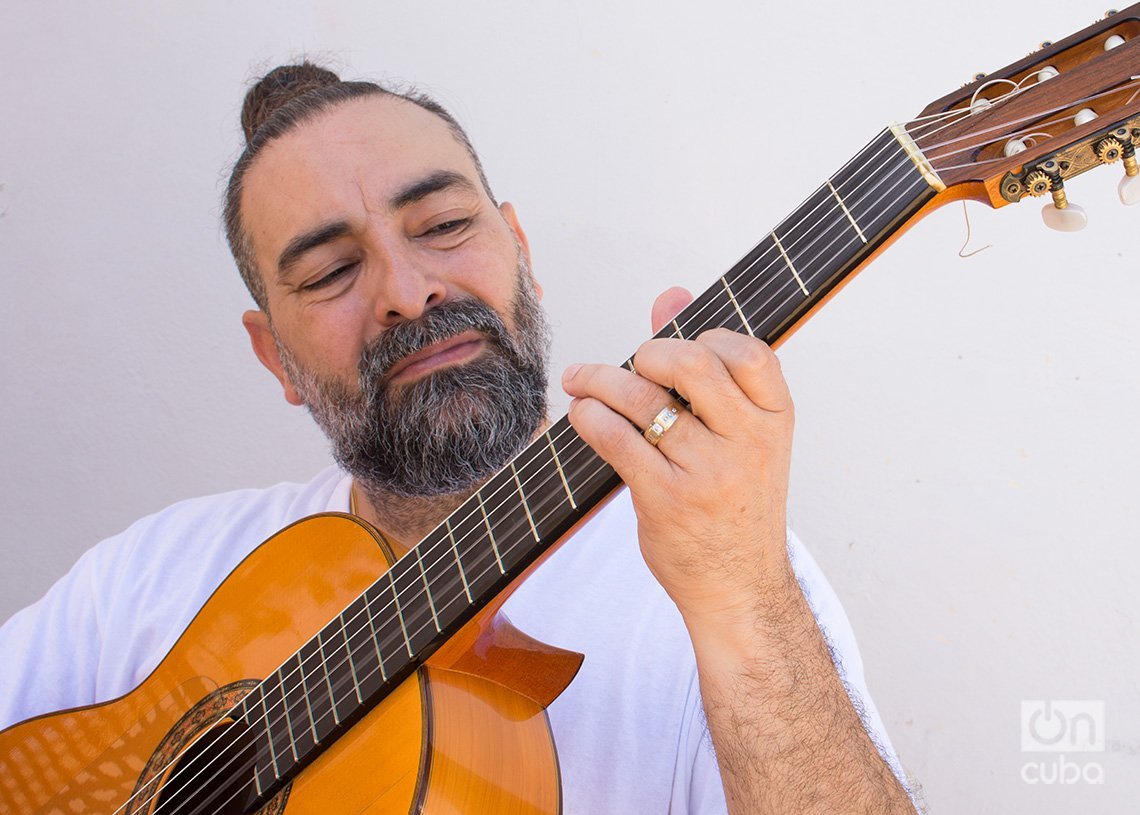
Why do you think this phenomenon has occurred or, rather, continues to occur?
There are several factors, as I told you. There is also a sociocultural phenomenon behind that, because I believe that Latin American people had never had music like disco, night music, like disco, techno in their rime, but it had never been Latin music, and reggaeton bursts into that space with its Latin rhythm, which is African in the end, and which is catchy, contagious, and has become tremendously globalized.
Reggaeton is electronic music, not acoustic, and that is why it is disco music, night music, and that is why it is the music of the kids, of the youth. And it’s not bad, because that type of music has always existed; the problem is in the language.
In the end, even if it is electronic music and for clubs, reggaeton songs are songs that transcend those places, that also resonate on a social level, already have weight in the industry, and win important awards.
And those artists, those singers, although more than one must be put in quotes, at the end they are communicators, they are transmitting a message, which is not the best, and they are destroying not only music but also society with that message.
This worries me and many friends, but the phenomenon has been catching on in people, and that has not only an immediate impact but also in the long term. All vulgar things should be banned because that degrades the country, and the culture.
What can be done in this scenario and, in particular, what could artists who, like you, defend Cuban popular music do?
Look, in all eras Cuban dance music was always first for the people, for the youth as well. There have always been tastes for other genres and currents, for disco music, American music, pop, in short, but except for some moments, such as a certain disconnection that existed in the 1970s, our popular music, our dance music, has always been the first in Cuba, in the taste of the people, in popularity, in its presence in the media, and that is no longer the case.
That has been neglected. The arrival of reggaeton, of urban music, has truly displaced our music, at least in a large majority of spaces and audiences. Even intellectuals listen to reggaeton, which is saying a lot.
There is also a responsibility of the musicians. For our part, we have to update ourselves, we have to experiment, renew, look for new, fresh formulas and paths, but always maintaining the essence of what we do and respect for Cuban music.
And we have to connect more with people, go to people, always be aware of the dancer, of society, like Formell did, like Adalberto did, and other greats did, and from there they came up with songs that caught on.
Nor are we as many as in other times, when there was a very strong movement of bands, of popular dance music groups. Today we are fewer, it seems to me. There are bands of many years that are classics, that have their stamp and have marked Cuban music, like Los Van Van, like La Revé, like Isaac, like Paulito, each one with his own style.
But young people who connect with the public through Cuban dance music, the truth is, there are not many, not even in my generation, since we are no longer kids. And that didn’t happen before.
I think the desire, the motivation I was telling you about, to remain connected to that music of ours, to continue making records and releasing songs, has fallen a little. And it’s up to those of us who are here to keep that motivation alive and infect those who come after us.
Also, the fact that those greats have left us like this, practically one after the other, Formell, Adalberto, Puppy, El Tosco, among others, has left a tremendous void, a void that is felt, and that it is up to those of us who are here to try to fill, with great respect for what they did and what they represent, because their music is immortal.
While many artists have left and continue to leave Cuba, Alain Pérez returned, and from here he has sought to continue projecting himself to the world. Why?
Because I decided it, that was my will.
I settled in Spain when I was 23 years old because they offered me a record contract to record my own album, which is El desafío, with my songs, my arrangements, with my own musical proposal, even though I was still green as an artist.
And from then on, as a result of that album, I began a career in which I grew personally and professionally outside of Cuba, from the experiences I had there, from the great artists with whom I played and shared, but also maintaining my solo career.
People think that I started singing when I returned to Cuba, but I was already singing before, because I always sang, I never stopped doing it, even though for a time I was more focused as an instrumentalist, or as a producer.
So, after the death of Paco de Lucía, with whom I was working, I felt it was time to reaffirm my own career as an artist. Once and for all. And I felt that Spain was not the place to do it. Nor Miami or Puerto Rico, but Cuba, my country, with my people.
Seven years ago, when I returned, many people in Cuba did not know me. I had played with Irakere, with Isaac Delgado, and had built an international career, but here people asked themselves: who is this? Where did that white man come from with the long hair, and the braid, and the cane? However, little by little my music and my project have become known, thanks to God and the work we have been doing.
That my music is known and recognized in Cuba means a lot to me, for what it was and what it is. What Cuba was, due to tradition and its rich musical history, and what it continues to be, even with all the situations and problems there are.
If I am from here, why can’t I say what I do from my homeland. I want to make music, my music, with my essence and with my ideas, and I think that Cuba is the best place to do it.

